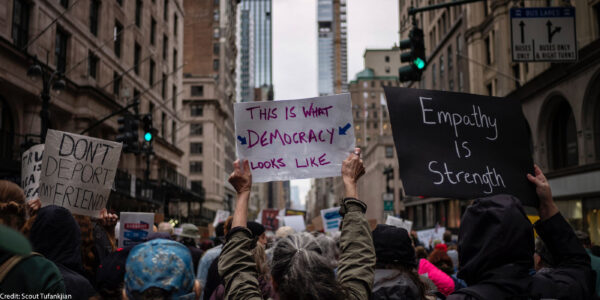
In the six days since Alabama's extreme anti-immigrant law has been in effect, the impact on communities across the state has been chilling. Parents are pulling their children out of school for fear of being forced to reveal their immigration status and some families are fleeing the state in order to avoid being separated from their children. According to an article in the New York Times today, "1,988 Hispanic students were absent on Friday, about 5 percent of the entire Hispanic population of the school system." An immigrant services helpline reported that they had received over a 1000 calls from people seeking assistance; some calls were from pregnant women afraid to go to the hospital, others from victims of crimes who now fear going to the police.
Although Alabama Gov. Robert Bentley is boasting of his "victory" in court, it is undoubtedly a shameful moment in Alabama's history, leaving thousands of Alabamians vulnerable to a myriad of civil rights abuses.
The nationwide shock and sadness over the court's ruling is palpable. An editorial in the New York Times today condemned Alabama for its unconscionable treatment of its own residents:
…[A]ttendance of Hispanic children has dropped noticeably since the word went out that school officials are now required to check the immigration status of newly enrolled students and their parents.
That rule is part of the law's sweeping attempt to curtail the rights and complicate the lives of people without papers, making them unable to enter contracts, find jobs, rent homes or access government services. In other words, to be isolated, unemployable, poor, defenseless and uneducated.
…[O]ne has to wonder at such counterproductive cruelty. Do Alabamans want children too frightened to go to school? Or pregnant women too frightened to seek care? Whom could that possibly benefit?
The ACLU is appealing the court's ruling. No family living in the United States should be afraid to send their child to school.
Take action: Urge the Department of Justice to challenge other anti-immigrant laws in Utah, Georgia and South Carolina.
Learn more about immigrants' rights: Sign up for breaking news alerts, follow us on Twitter, and like us on Facebook.
Stay informed
Sign up to be the first to hear about how to take action.
By completing this form, I agree to receive occasional emails per the terms of the ACLU's privacy statement.
By completing this form, I agree to receive occasional emails per the terms of the ACLU's privacy statement.



